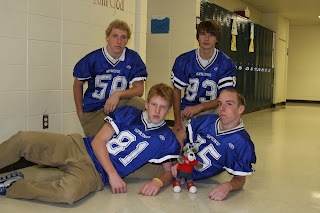For something new, I'm going to try this month to limit my mention of food in my "Highs". Let's see how that goes.
HIGHS
- meeting another expat blogger (Around the Wherever) in Esslingen at the Weihnachtsmarkt and hanging out for a few hours on a Saturday. She's originally from the American Midwest as well! We played Mäuseroulette, and I actually won this time! I kept my stone but gave the prize to a little Italian girl who had played that round as well but didn't win.
 |
| Darling Zora posed before running into the house with my stone on it! The children are doing "mouse applause" with their fingers. |
- visiting Tübingen's Chocolate festival for the second year, buying gifts, and tasting samples. Yum!!
- visiting the Hermann Hesse Kolleg several times and sitting in on classes where refugees are learning German. I was able to participate in the class and work with the students I was sitting near. One of the students asked me what a "Schirm" is, and I answered in German and pantomime: "When it rains I need an umbrella." He understood and wrote down the definition in Arabic. Then he looked at me and said, "You know English - why didn't you just tell me the English word?" "Because you don't learn as well if I just give you the answer!" :-)
- Friday morning riding lessons. I ride a sweet little horse named Mallory. Actually she's more bitchy than sweet, but she does her job well and puts up with me.
- appearing in a newspaper photograph that accompanied an article about the weekly Sprach-Cafe I attend where refugees, volunteers, and townspeople come together for refreshments and conversation.
- Christmas, of course - a lovely, quiet celebration with my Schwiegermutter, M, and me as my kids headed to Disney World with my parents. Given and received were several books including two about food photography, calendars, socks (because M actually does like getting socks for Christmas!), lotion, knife sharpener blades, an in-home cooking class featuring sauces, and a day out shopping for "horse stuff."
- bumping into an acquaintance of mine on a spontaneous trip into town and being offered a job! I wasn't looking for a job and never thought I'd want to teach again, but there is a need that I can fill. I can only commit to part time, but it looks like I'll be teaching basic German to at least one class of refugees four or five afternoons a week.
- meeting my Gastmutter, my exchange partner, her husband and three of their kids for lunch in Esslingen. Although we didn't take any pictures, I truly enjoyed the afternoon! Incidentally, my exchange partner married an American and they live in Wisconsin, and as you know I married a Swabian and live in southern Germany. Little did we or our parents know, back when we applied for that exchange 30 years ago, how all our lives would change because of it.
LOWS
- news from the U.S. that Donald Trump is still the most popular GOP candidate for the presidency. Seriously, people?
- the package I mailed to my family in Wisconsin not making it there in time for Christmas.
Curiosities
- 250g of powdered sugar costs €1,19, while the same amount of regular sugar costs €0,16. I can make powdered sugar in our Thermomix in 10 seconds. Guess who's never buying powdered sugar again?
- Vanilla extract is not sold in Germany - at least I've never been able to find it, and it's not an ingredient ever called for in German recipes. I learned that one can make vanilla extract by immersing sliced vanilla beans in vodka and letting it rest in the cellar for 8 weeks (giving it a shake once a week). I'll let you know at the end of February how it turned out.
 |
| one bean per 2 ounces of vodka |
That's it for the year. Tonight we have fondue, "Dinner for One,"the British comedy sketch that is cult in Germany - Bleigießen (pouring melted lead into cold water to tell our fortunes), and neighborhood fireworks at midnight while M prowls around the house checking for errant burning rockets. Cheers! Slainte! Prosit!
Prepping the fondue:
 |
| Suppenfleisch |
 |
| roasting the soup bones means less fat in the soup |
 |
| Suppenfleisch, roasted bones, long pepper, anise, veggies, herbs from our garden and parsley simmer on the stove for hours |
 |
| pork and beef tenderloin, fresh veggies, Sahne Dip, fondue broth...ready to begin! |
 |
| Bleigeißen tools - plus a glass of water |
I wish you all a fabulous New Year's Eve
and a great and healthy start to 2016!!


























.jpg)














